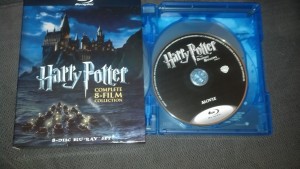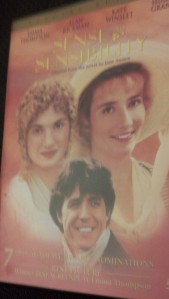The Task: Watch and write about every movie on my shelf, in order (Blu-rays are sorted after DVDs), by June 10, 2015. Remaining movies: 57 Days to go: 40
Movie #383: Harry Potter and the Deathly Hallows, Part 1
So now the quest for horcruxes begins in earnest. Harry (Daniel Radcliffe), Ron (Rupert Grint) and Hermione (Emma Watson) are preparing to set out as soon as Harry turns seventeen and is no longer a minor under magical law. For Hermione, who has non-magical parents, this means wiping their memories entirely, so as to protect them from anyone who might want to get to her. For Harry, his own muggle family the Dursleys (beautifully played over the course of seven films by Richard Griffiths, Fiona Shaw and Harry Melling) are evacuating the house on Privet Drive. And soon the Order descends on the house to pick up Harry himself, secreting him away to the newly protected home of the Weasleys. (Several of whom will be disguised as Harry himself — a fun bit of comedy and special effects to get the ball rolling. The Weasley twins (James and Oliver Phelps), especially, are great fun at all times. If you do not have a favorite, and if that favorite is not Fred (James), then I don’t understand you at all.)
This first action sequence is both thrilling and terrible, as the Order is attacked by Death Eaters and not everyone makes it out alive. Mad-Eye (Brendan Gleeson) is killed, but sadder still is the loss of Harry’s loyal owl Hedwig. This, plus the injury to George, sets the tone right from the start: No one is safe. Lives will be lost. The final confrontation is near.
But before that confrontation can come, the three friends are forced to go out on their own and fumble about, trying to find the missing horcruxes, to figure out what they even are, and to prepare themselves for the meeting with Voldemort (Ralph Fiennes). And Voldemort is preparing too. As we see in Harry’s dreams and visions, Voldemort is after something as well. He wants a wand, the Elder Wand, in fact, a wand said to be the most powerful in the world.
The animated telling of the story of the three brothers, wherein the legend of the Deathly Hallows emerges, is one of the most beautiful and haunting sequences in any of the films. Narrated by Hermione, the tale identifies the three magical objects known as the Deathly Hallows — the Elder Wand, the Resurrection Stone and the Invisibility Cloak. These three items can help one become master over death, able to defeat it, and they will be invaluable to the wizard that claims them.
More than any of the other films, Harry Potter and the Deathly Hallows Part 1 is about the relationship of these three friends, about their fears, their strengths, their weaknesses, their passions, and their loyalty. It’s about the strong sibling-esque bond between Harry and Hermione, the brotherly love (and sometimes rivalry) of Harry and Ron, and the growing love and closeness between Hermione and Ron. The movie is almost naturalistic in this sense, focusing simply on the mostly aimless wanderings of three young adults, trying to make their way, to reach their goals. But for all that simplicity, there is also quite a bit of action and suspense in this final installment before the end.
There are several attacks on the trio as they live on the run from Death Eaters and Snatchers, both in the woods, on the London streets, and at the home of Xenophilius Lovegood (Rhys Ifans). There are also the scenes involving the locket horcrux, when the friends sneak into the Ministry thanks to the Polyjuice potion to steal it from Dolores Umbridge (Imelda Staunton), plus the scene in the Forest of Dean when the patronus of a doe reveals to Harry the location of the Sword of Gryffindor, which can destroy the horcrux. (This is the third time Harry nearly drowns, though he is thankfully saved by Ron, who rejoined his friends thanks to the deluminator left to him in Dumbledore’s will — an object that first appeared in the first scene of the first film in the series.) The actual destruction of the horcrux is also pretty harrowing, playing on every one of Ron’s insecurities. And then there’s their capture and escape from Malfoy manner, as Bellatrix Lestrange (Helena Bonham Carter) tortures poor Hermione and dear sweet Dobby the Elf (voiced by Toby Jones) loses his life to save the others.
Sadly, not every aspect of Rowling’s exquisite book could be included in the film, and the tale of Kreacher (voiced by Simon McBurney) — one of my most favorite, most heartbreaking scenes in the novel — is all but entirely lost. But the overall story of the first half of the book is held remarkably intact and I find myself incredibly grateful that the finale was split into two films. For how much more could you cut?
Next, we open on the close, in which Voldemort has the Elder Wand (stolen from Dumbledore’s tomb) and things will finally come to an end for Harry Potter.




